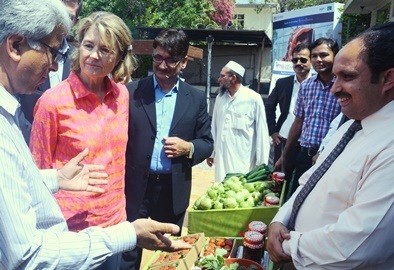
For Immediate Release
Islamabad, April 9, 2015 – The United States Agency for International Development (USAID) helped more than two hundred Pakistanis farmers bring off-season vegetables to the second annual Vegetable Fair in Islamabad today.
“The produce we see here today marks the large-scale introduction of greenhouse technology in Pakistan. Through the establishment of high tunnels and the adoption of modern farming practices, USAID is helping farmers increase yields, create more jobs, and earn higher incomes,” said Nancy Estes, Acting Mission Director for USAID Pakistan at vegetable fair’s opening ceremony. Nancy Estes also stated that Pakistani vegetable exports have seen dramatic growth since 2007.
For the past two years, USAID has worked to introduce new technologies and agricultural management practices to 118,400 farmers in Pakistan, helping to develop 60,000 hectares of land. USAID programs provide a wide range of support to Pakistani vegetable farmers including: improved seed, toolkits, and greenhouse tunnel technology.
USAID has worked extensively with Pakistani farmers to introduce new techniques such as “high-tunnel” farming that enables farmers to produce off-season vegetables, greatly increasing land productivity and profitability. USAID’s overall agribusiness programs help Pakistani farmers increase productivity of banana, chili, high-value vegetables, seed potato, grapes, apricot, and citrus. The program introduces best practices and technology, while supporting market linkages and international quality certifications to improve agricultural output throughout Pakistan.
Azam Shehzad, a farmer from Banda Sheikhan-Khawjgan, Mansehra, said, “The new high-tunnel farming techniques I learned through USAID have greatly improved the profitability of my farm. Now I have the confidence to brand my produce and sell to quality-conscious retail chains.”







Comment
Make a general inquiry or suggest an improvement.